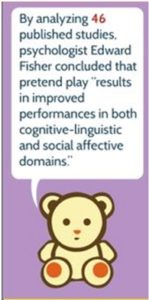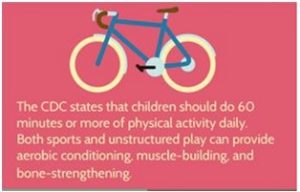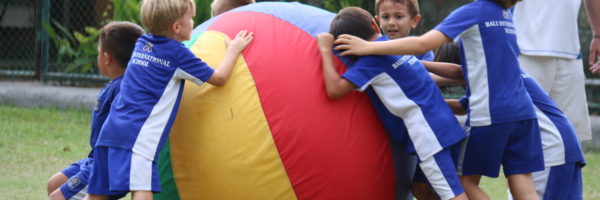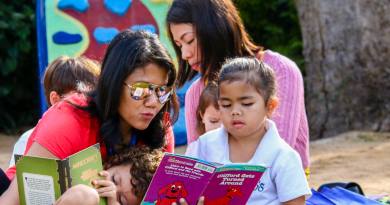Don’t Forget to Play!
 Skills-based learning and opportunities for inquiry are surely key components to a well-rounded education. In sending our children to school we all probably have a similar end game in mind. We want our children to become knowledgeable, avid thinkers who engage respectfully and are motivated to tackle complex problems and achieve their utmostpotential.In attempting this goal, there is a key component to brain development, which is sometimes overlooked. Simply put, oneof the most beneficial things you can do for your child is to allow for regular opportunities for both structured and unstructured playtimes. When children partake in the simple act of playing, many complex skills and cognitive functioning abilities are developed.
Skills-based learning and opportunities for inquiry are surely key components to a well-rounded education. In sending our children to school we all probably have a similar end game in mind. We want our children to become knowledgeable, avid thinkers who engage respectfully and are motivated to tackle complex problems and achieve their utmostpotential.In attempting this goal, there is a key component to brain development, which is sometimes overlooked. Simply put, oneof the most beneficial things you can do for your child is to allow for regular opportunities for both structured and unstructured playtimes. When children partake in the simple act of playing, many complex skills and cognitive functioning abilities are developed.
Why is ‘play’ so important to child development?
Kids learn about their world through the act of imaginative play as well as more structured play activities such as games and sport. Sometimes, the importance of play is overlooked, despite it being one of the best ways to help build a child’s social skills, intelligence, problem solving abilities, physical coordination, and lifelong coping mechanisms. Adding even more independent playtime into children’s lives give them the opportunity to be creative as well as reflective. The act of play helps children to achieve emotional wellbeing, cognitive development, and appropriate social skills. Perhaps most importantly, it’s FUN!
Emotional Wellbeing:
The ‘fun’ aspect of playtime can logically lead to a betterment of overall emotional wellbeing. There is a growing body of evidence to support that ‘wellbeing’ greatly impacts academic achievement. For example, researchers at Research Schools International found that, “on average, students who reported being happier had higher grades. Specifically, they found a statistically significant correlation between happiness and students’ GPA from elementary school through high school.Students also reported that happiness, or positive feelings like enjoyment or fun, supported their schoolwork.
Cognitive Functioning
When kids play, they learn. Play allows children to practice decision-making, use their imagination, and take on active leadership roles. Through play, they also grow in confidence and resilience. When it comes to brain development, time on the playground may actually be as important as time spent in the classroom. According to a researcher at the University of Lethbridge in Alberta, Canada, “the experience of play changes the connections of the neurons at the front end of your brain, and without play experience, those neurons aren’t changed”.Play is said to be a developmental tool that promotes the executive functioning regions of the brain that are responsible for organization, working memory, cognitive flexibility, reasoning, problem solving, planning and time management. Perhaps this is why that the skills associated with play are said to ultimately lead to better grades.
Social Skills Development
Play also stimulates initiative and engagement, rather than a tendency to passively observe what others do. In other words, it encourages healthy social skills development. Researchers at Washington State University have stated that, “the function of play is to build pro-social brains, social brains that know how to interact with others in positive ways,” In one study, researchers found that the best predictor of academic performance in eighth grade was a child’s social skills in third grade.Simply put, play is an effective way to socialize and make friends as well as foster academic progress. Whether it is a game of football on the field or two kids building a sandcastle, children are in a situation where they have to be good communicators who negotiate well, create and play by the same rules. This act in itself is said to build new circuits in the prefrontal cortex.
How much play should my child get on a daily basis?
For some ballpark numbers, the Nemours Foundation suggests that toddlers shouldn’t remain idle for more than an hour at a time. The foundation’s guidelines provide for approximately 30 minutes of adult-led physical activity and 60 minutes of unstructured play everyday. Other sources offer similar guidelines, although most professionals agree the time frame should be dependent on the particular needs and abilities of the child.
What is the difference between ‘structured’ and ‘unstructured play’, and which is more important?
Structured Play
As a general rule, structured play includes rules and objectives all of the following would be examples of ‘structured play’:
- Card games
- Board games
- Classic outdoor games, like red-light-green-light and tag
- Puzzles
- Organized sports
Unstructured Play
Unstructured play is open ended with unlimited possibilities. Examples of unstructured play includes:
- Playing with blocks
- Colouring and drawing on blank paper
- Dolls or a toy truck
- Invented games and playing ‘pretend
- General playground activity
Structured and unstructured play is equally valuable. What is said to be more important than the balance of ‘structured’ vs. ‘unstructured’ play, is to consider the level of engagement your child has within the play setting. If the play is holding your child’s attention and your child is fully absorbed in the activity, it is generally deemed a valuable play experience and your child is making meaning from that experience. That said,even more important than the choice between structured and unstructured play, is that play should be interactive rather than passive. Most pediatricians warn against activities that limit interaction and thought. Television shows are most certainly considered passive activities, as are the many video games. Sometimes the most ‘old fashioned” of games, such as a box full of blocks, a deck of cards, or a ball in the middle of a field, might be considered the most rewarding activity for brain development.
Overall, allowing for playtimein children’s lives provides themwith opportunities to foster their own creativity, navigate social situations and become more physically active. Play is not only essential to the development of cognitive, physical, social, and emotional well-being of children, but also functions to allow the brain to be more adaptable as children take on more and more responsibilities as they get older.Remember to play! It’s lots of fun, and there are many people out there studying how great it is for the brain.
“Caution! Children at Play!” HealthyChildren.org. N.p., 21 Nov. 2015. Web. 14 Aug. 2016.
Hamilton, Jon. “Scientists Say Child’s Play Helps Build A Better Brain.” NPR. NPR, 6 Aug. 2014. Web. 14 Aug. 2016.
Klemm, William, Ph.D. “The Neuroscience of Why Children Play.” Psychology Today. N.p., 12 Dec. 2014. Web. 14 Aug. 2016.
“Spaghetti Box Kids.” Spaghetti Box Kids RSS.N.p., 3 Sept. 2008. Web. 14 Aug. 2016.



